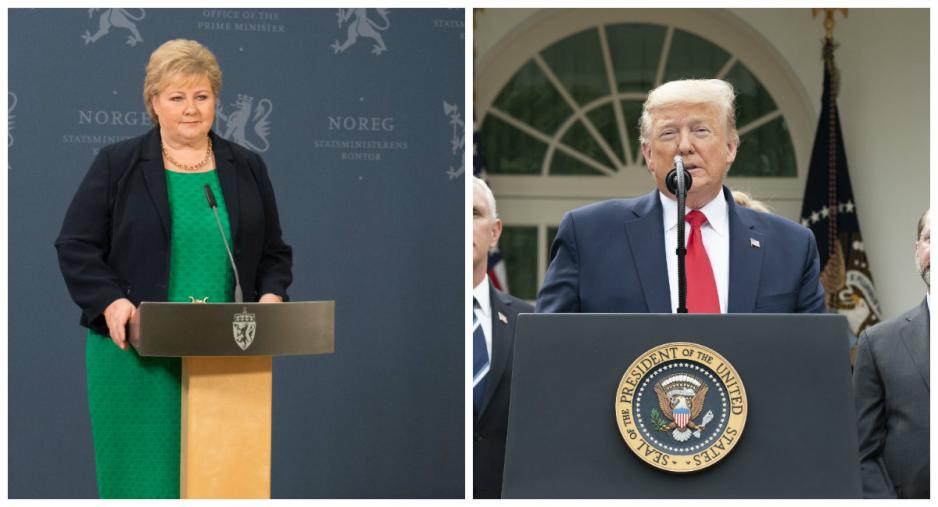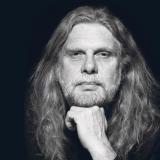No Time to be Cocksure, Nor a Time to Bend Over

Erna Solberg and Donald Trump have chosen very different strategies. Which is also an argument for participating in the debate about the political fight against the corona virus. Photo of Erna Solberg: Arvid Samland, SMK. Phtoto of Donald Trump: Shealah Craighead/The White House)
COMMENTARY: This is not a time to be cocksure, nor is it a time to bend over for political use of power. Various countries’ measures to counter the corona virus vary too much for that. Other than a joint desire for the world to manage through this virus attack, various countries’ measures vary from Donald Trump’s witchcraft to national state of emergency laws in Norway.
As citizens, we are obliged to obey and bend over for these very different national strategies, because all political measures are based on medical reasoning. We are left in the middle of the cannonade, pretty confused and often in despair, as one political attack on the virus is followed by the next. It is not the case, which is natural in the current phase, that medical experts agree on what measures are required. Nor is it the case that the decision-making authorities draw the same political conclusions based on the advice they are given.
Rather on the contrary.
On the edge of life’s ditches
That is why we both will and should participate in the political debate about the way forward towards a virus-free world. Medical boundaries are blown now, not the political framework around our democracy.
We will, for instance, care about political solutions that save business and industry if that also means that people on the edge of life’s ditches are sacrificed. Even before the corona virus hit, substance abusers lacked rights that the rest of us take for granted. If the weakest amongst us are pushed over the edge, or ignored, when salvage packages are handed out to business and those of us who have a job, it is our duty to ask questions about the allocation of such economic life vests.
We cannot save economic speculators while pushing those at risk over the edge
Those who for various reasons are the ones managing current challenges the least well, because life was hard enough before the corona outbreak, have the same claim to attention as those whose interest organizations write public resolutions with caps lock.
Without political opposition, US President Donald Trump would still have insisted that the virus was a hoax, staged by political opponents who – for good reasons – wanted to leave him politically dead. That it was a flu that he, and he alone, was in full charge of. Now that his narcissistic approach has been broken down by the virus itself, and by an American health care system incapable of managing the pandemic that the President argued did not exist, he has moved his attacks onto Chinese authorities. It is no longer a Democratic virus; it is a Chinese one.
In the end it was a combination of collapsing markets and fear of losing power that forced the President to look for measures that work against the rising death toll in the USA. Yet in Trump’s eyes, it is still about his outstanding efforts.
At the President’s last press conference, the media was once again blamed for the situation because the media did not acknowledge his tremendous effort.
State of Emergency exceptions
In Norway, the authorities respond far more proactively, even when it is politically controversial. Though ‘politically controversial’ may be taking it one step too far.
When the government currently proposes a proxy law that sets the constitutional principle of separation of powers aside, it happens without a broad political debate. Objections mainly come from lawyers, who nevertheless warn strongly against the consequences of such a law. That goes to stress the need for a political debate alongside the medical protection measures.
The various national measures range from political witchcraft to State of Emergency laws.
Just like I do not have the competence to influence medical assessments, nor do I yearn for political solutions that challenge democracy itself. The fact that something may appear to be medically rational does not make it politically acceptable.
Political scientists and lawyers do not interfere in the debate about infection protection measures. But we should listen to them when there is talk about introducing an emergency law that will have far-reaching consequences for the order of our society.
Secret group of doctors
And when a bunch of doctors; 2,500 according to Norwegian daily Dagbladet, which revealed the story, hide behind secret Facebook accounts while they aim their guns at the political authorities, that is a strategy that calls for political discussion. Using a lawyer as their spokesperson, they manage to convince Dagbladet that they are indeed doctors and that they do know what they are talking about.
That they know what they are talking about when they want legislation that enables the government to edit Norwegian news media.
Neither Dagbladet nor the spokesperson for the secret doctor group say anything about how and amongst whom this and other radical proposals have been discussed. Nor do they say why medical personnel feel competent to set the freedom of the press aside.
Such measures, everything from extensive proxy laws to state control over the media, are a common strategy in regimes with which Norway bears little or nor resemblance. But the reasoning is the same: A measure required in order to control a complicated political agenda.
Just as we, journalists, cannot claim to hold medical competence should health personnel be given authority when it comes to democratic rights.
Now, many would argue that we journalists interfere with things we do not understand.
That may be so. But it is our damned duty to challenge political authority – also during a national crisis.

